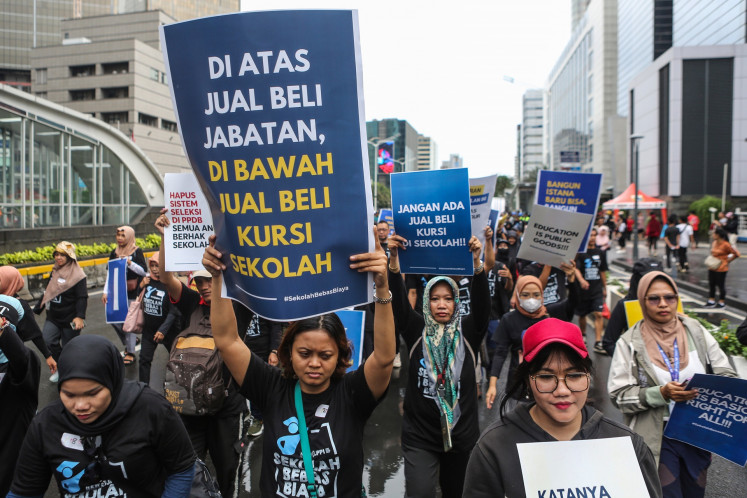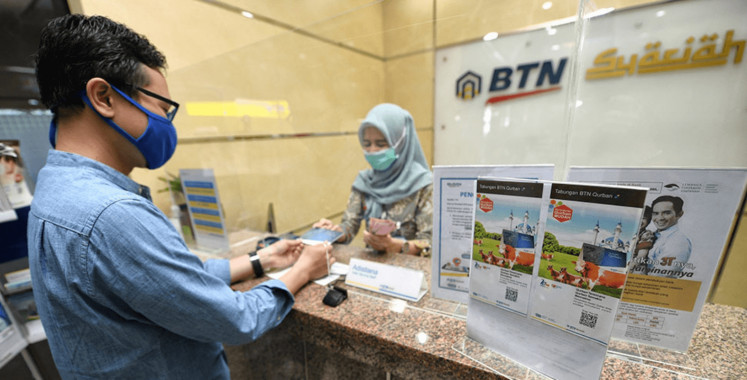Hospitals seek legal immunity in bill
Legislators are rushing to give hospitals and doctors a parting gift of a dose of legal immunity against lawsuits over medical malpractice and negligence
Change text size
Gift Premium Articles
to Anyone

L
egislators are rushing to give hospitals and doctors a parting gift of a dose of legal immunity against lawsuits over medical malpractice and negligence.
Patients and their relatives may want to watch out for legal land mines in the latest draft of the hospital bill, a copy of which was obtained by The Jakarta Post.
Scheduled for passage before legislators end their tenure in late September, the hospital bill has been sitting in the legislature for three years.
Among the clauses is a chapter on hospital legal protection that says, "A hospital may not be prosecuted while conducting its main function in saving human lives."
The Health Ministry's director general of medical services, Farid Husain, says the legal protection clause is necessary for hospitals during an emergency situation, otherwise their employed doctors could refuse to take on patients for fear of prosecution should anything go wrong.
"The clause is clear enough. Doctors and hospitals can't be legally held responsible if, during their handling of patients in emergency, things go wrong," Farid says.
"They're helping people. Why should they risk going to jail for this noble cause?"
However, noted lawyer Hotman Paris Hutapea, who specializes in medical malpractice and negligence, says the article is too general and will effectively discourage any efforts by patients seeking justice against perceived hospital wrongdoings.
"This article is ridiculous," says the flamboyant lawyer.
"It's like saying we can't sue a reckless bus driver for dangerous driving, as he's just doing his job."
But jumping to the defense of patients is another, seemingly contradictory clause: "A hospital is legally responsible for all damages caused by negligence committed by the employed medical workers."
Yet another clause states hospitals have the right to sue any parties deemed a danger to the institutions. Similar rights for patients are absent from the latest draft.
Hotman says the bill may have been sponsored by donors whose interests are increasingly at risk due to litigation.
"We should be watchful of these donors, especially hospital investors, who use all means to get legislators into their pockets," the top-flight lawyer says.
Drawing on his experience during the deliberation of the medical practice bill in 2004, he says intensive lobbying of legislators by those in the medical business contributed to the current law that he says is overly protective of doctors, to the detriment of patients.
"The current situation is similar to that in 2004 ... legislators are about to end their tenure, public attention is on the election, and lobbyists operate freely, unnoticed," he says.
The medical practice law has seen patients opt for amicable settlements and financial compensations, rather than take their cases to court, according to University of Indonesia medical expert Hasbullah Thabrany.
A loose definition of malpractice, the lack of standard operating procedures, and strong solidarity among doctors have made it difficult for law enforcers and judges to proceed with cases of suspected malpractice or negligence, lawyers say.
Hasbullah says the hospital bill will become yet another legal barrier for patients.
The bill has also failed to regulate the relation between hospitals and the pharmaceutical industry - widely blamed as the root cause for the seemingly protracted mess in the national health management.
Amid today's wide choice of glitzy hospitals, the channels for patients' complaints are still muddled. Indonesian Hospital Union (PERSI) chairman Adib A. Yahya says the hospital bill serves no other purpose than to regulate the current mushrooming of hospitals and ensure quality, cost and safety.
He denies there is any lobbying of legislators taking place to accommodate the interests of the industry.
"The bill will actually protect patients from overmedication and overtreatment," he stresses.
"It's about time hospitals were well regulated to ensure protection for all stakeholders."
Max Sopacua, from the House of Representatives' Commission IX for health, education and social affairs, denies suggestions the bill could put patients at risk.
"There are no clauses in the bill that favor hospitals over patients," says the Democratic Party legislator.
"We want to make sure patients and hospitals are clear on the rules.
"Any reservations to the bill should have been filed much earlier. We've been working hard on this, and the bill is near completion."









